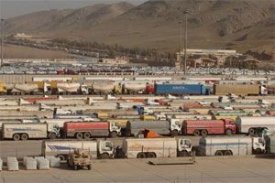Logistics in Iraq Modernises with New Freight Truck Location and Cargo Management System

Returning to any sort of normality after years of bloody conflict is never easy but as Iraq emerges from the shadows of two debilitating wars, there are signs that both physical and intellectual infrastructures are returning stronger than hitherto despite the perceived need for constant security. In order to ensure safer freight movements from its ports, the General Company for Ports of Iraq (GCPI) last month signed a 10 year service contract with Jordan-based logistics service provider, Nafith Logistics, to police the movement of trucks transporting cargo to and from all Iraqi ports. GCPI General Director Omran Radhi was quoted by local sources, saying:
“Nafith is helping the General Company for Ports of Iraq with [this] project's technical studies and requirements so work can begin by the end of the year. We signed the contract after putting out an announcement a few months earlier for the project's tender, to which several local and foreign companies submitted bids. Nafith was selected after all the competing offers were evaluated.
“The project will facilitate the entry and exit of trucks to the port areas as well as monitor and secure their movement on main highways and at their loading and offloading sites by way of a Global Positioning System (GPS). It will also bolster Iraq's trade activity, as it facilitates the transportation of goods and raw materials exported or imported by companies in the public and private sectors, in exchange for low fees levied on truck movement.”
Nafith (National Freight Information & Transportation Hub) started life in the US as a United States Trade & Development Agency (USTDA) funded pilot project utilising NXfolio, a logistics data management framework developed by NTELX (or FreightDesk Technologies Inc. FDfolio™ system depending whose website you rely on) before migrating to Amman in Jordan. From 2005 the company worked on building a secure traffic management system to control movement throughout the Aqaba Special Economic Zone. Up until 2006 Aqaba, Jordan’s key (and only true) seaport had been an uncontrolled cargo centre with long vehicle queues and delays to import and export freight the norm.
This latest company project will start at Iraq’s only deep water port, Umm Qasr, and will then be rolled out to the other ports in a similar fashion as that which has been seen in Jordan with whom Iran has a bi-lateral trade cooperation agreement. Sabah al-Sarraf, Maritime Department Manager at the Technical Office of the Iraq Ministry of Transport, commented:
“Introducing the new system at the ports is a first step and it will eventually be applied at all Iraqi border outlets with neighbouring countries. Under the new project, officials will create a complete database of drivers and trucks operated by public and private land transport companies. The names and personal data of regular drivers will be recorded, and they will be given permission to drive their trucks into port areas, where they will be able to load or offload their cargo in an organised way.
"This project will not be restricted to managing and organising truck movements inside port areas, but will also enable us, through the use of advanced devices and technological equipment provided by the company, to track trucks and their movement on highways electronically, to ensure their safety and their smooth travel.
“Through the project, the ministry seeks to improve its services by introducing modern technologies and systems into this field, help eliminate truck congestion problems at ports and border outlets, boost trade exchange, and increase co-operation between Iraq and other countries.”
Photo: Hundreds of trucks wait to move into Iraq as they are staged at the 609th Movement Control Team's staging yards located at Habur Gate, Iraq. The 609th MCT had to validate, receive, stage, and monitor the movement of cargo shipped into Iraq for Coalition forces. (U.S. Army photos by Spc. Michael Behlin - Credit: 3rd Sustainment Command Public Affairs)

